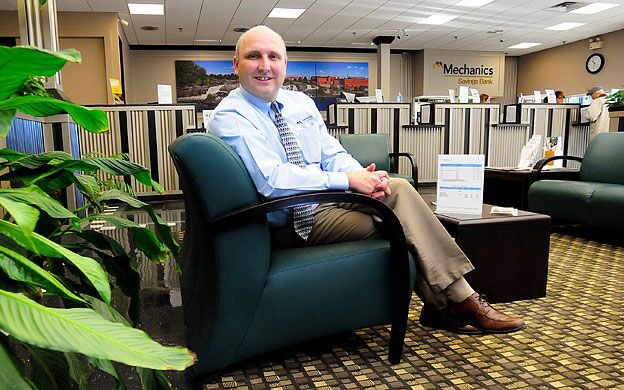Avoiding the culture clash a merger can bring
 photo/Amber Waterman
Jeffrey Gosselin, a senior vice president and commercial banker at Mechanics Savings Bank, is happy he made the switch to the smaller community bank after his previous employer merged with a giant, international bank. The change lessened Gosselin's decision-making independence, prompting his move to Mechanics.
photo/Amber Waterman
Jeffrey Gosselin, a senior vice president and commercial banker at Mechanics Savings Bank, is happy he made the switch to the smaller community bank after his previous employer merged with a giant, international bank. The change lessened Gosselin's decision-making independence, prompting his move to Mechanics.
After Toronto-based TD Bank Financial Group completed its acquisition of Banknorth in 2007, commercial lender Jeffrey Gosselin began to notice changes in the corporate structure of the new company.
Having spent nearly a decade as a commercial lender with Banknorth, Gosselin watched as everyday procedures at TD Banknorth became subject to an additional level of scrutiny from the larger, $510 billion bank.
“When a larger institution takes over a smaller company, they understandably want to have centralized control,” says Gosselin, who was a vice president of commercial lending for TD Banknorth. But he took exception when he lost the independent authority to approve commercial loans and instead had to send applications up the chain of command to decision makers within the larger TD organization.
“In Maine the [business] community is small and parochial; people like to do business with people who make decisions,” he says. “I need to be able to make decisions to serve my clients, and [they] need to see me as a trusted adviser who has the authority to make decisions.”
After giving it several months, Gosselin and two other commercial lenders left TD for the much smaller Mechanics Savings Bank in Auburn.
“I'm a professional, I'm not naive. When you buy a company, the only way to become successful is if you gain efficiencies; you don't pay a premium for something to leave it the way it was,” says Gosselin, now the senior vice president for commercial lending at Mechanics. “TD did everything right, but it's a big bank trying to do business in a small town.”
New environs
Gosselin's experience highlights the culture clash that can occur when a larger company takes over a smaller one. Inevitably, policies affecting everything from decision-making authority to casual Friday dress codes can come under review and become a source of conflict. The situation is fraught with potential human resources pitfalls as two disparate and sometimes competing companies find themselves sharing the same corporate umbrella.
“Employees don't know how it will affect their everyday life,” says David Ciullo, president of the Portland-based HR services firm Career Management Associates.
“Their first concern is usually the security of their job and how their family and income will be affected. Second, they want to know if their life is going to change. Are there going to be new demands? Are the expectations going to change? Are they going to have the same boss?” he says.
The latter can be a big source of stress for employees of the company being acquired, who might have forged a special relationship with a manager or boss who's headed out the door, leading them to question their own role within the new company.
“People work for people, they don't work for companies. So if I like my boss and now there is going to be a change in that, that's a big stressor,” Ciullo says. “You can integrate two different accounting systems pretty easily; it's not as hard as learning a new boss. People are more difficult to learn than systems.”
Once the initial shock wears off and the new corporate structure starts to take shape, a whole new set of worries can set in, according to Ciullo.
“People want to know, what's the culture of the new organization? Is it more corporate? Less corporate? More or less strict? And things as silly as, 'Is the company picnic going away?'” he says.
The procedural quirks and demographics of a newly expanded company can make it difficult to satisfy and retain talented employees as former “top dogs” find themselves begging for scraps around a crowded corporate dinner table.
“If a No. 1 salesperson is [joining] a team of 50, there needs to be communication to see where they fall in the pecking order,” says Ciullo.
Johnna Major, president of Scarborough-based Cornerstone HR and a certified senior professional in human resources, has worked with two longtime clients who went through acquisitions over the last year.
Major didn't specialize in HR issues related to mergers and acquisitions and says she was caught off guard by the seemingly ad-hoc nature of what she says should be a delicate process.
“I was surprised at the lack of planning by the bigger companies in terms of having a thoughtful process for looking at resources and really evaluating things in a more systematic way that I think would have made things easier on both sides,” she says.
With the ball in the larger company's court, employees of the acquired company often feel sheepish about sharing their own thoughts and feelings on a rapidly changing corporate culture, according to Major.
“Often, the bigger company does its due diligence around culture, so I think it's harder for companies in the position of being acquired to perhaps push back on some of those things and ask questions about what this means,” she says.
While often anxious about their changing workplace, Major says, employees within the acquired company might not feel comfortable speaking up for fear of being the squeaky wheel that gets the axe.
“If they assume there is an opportunity for feedback and that's not the way the bigger company is thinking, they might be perceived as being uncollaborative,” she says.
And smaller companies should not harbor any illusions about retaining their autonomy, in Major's experience.
“Even if the big company comes in and says, 'You're still going to get to do things your way,' I just haven't seen that happen. There is always a higher level of scrutiny,” she says.
General unease over a merger can also decrease productivity if the transition is not carried out in an open and transparent manner, says Major.
“It tends to take away from productivity because people are nervous and there is more chit-chat in the hallway. If they are not getting [information] from the acquiring or existing companies, they are going to turn to each other to fill in the blanks, and that can turn into a lot of wasted time,” she says.
Understanding one another
Communication is the simple solution to nearly all of the problems presented by the culture clash that can come with a merger or acquisition, according to Ciullo and Major.
“The advice I always give to clients is communicate more than you think you need to. It lets people know what to expect,” says Major. “Absent people understanding what is happening, they will fill in the void with things they are afraid of and rumors blown out of proportion.”
Transparency and communication are especially important in retaining top talent within a company, says Ciullo.
“Key players need to be involved ASAP; you need to show them that it is going to be good for them and engage all employees in achieving the common purpose of the new company,” he says.
Quickly implementing potential changes gives employees less time to fret and can be a boon to transition-era productivity.
“The quicker the better, don't delay. Businesses hate uncertainty, so if [the employees] know there is going to be a new system, just put it in place, don't make them suffer for another few months,” says Ciullo.
Getting it right
Communication was key in the February 2012 acquisition of heating oil company Webber Energy Fuels by its larger competitor Dead River Co.
“You can't avoid culture clashes, but you can minimize them as much as possible,” says Guy Langevin, vice president of human resources and development with the South Portland-based Dead River Co.
The purchase of Webber for an undisclosed price occurred just three months after Dead River merged with Vermont-based Fleming Oil.
Dead River took over Webber's retail fuels division, including propane and oil delivery. Webber's wholesale fuels, energy gasoline and energy transportation divisions were not part of the deal. The acquisition moved 225 employees from Webber to Dead River, but caused only a minor case of culture clash, according to Langevin.
“Prior to the acquisition, we shared a lot of the same values and beliefs, but we still put a lot of focus on trying to be proactive,” says Langevin.
He says Dead River tried to conduct a very transparent process with a focus on quickly sharing information with employees from both companies.
“When employees have questions, we had a mechanism for getting those questions to us. We did a weekly FAQ that didn't just go to Webber employees, but also Dead River employees, so they knew what was going on and what expectations were being set,” he says.
The Dead River transition team tried to put itself in the mindset of its newly acquired employees and answer “What does this mean to me? Because once you're able to answer that, then their focus goes from the personal back to the business and the customer,” says Langevin.
Questions relating to employment, pay and benefits were answered quickly, and a comparison that showed which benefits were changing and how they affected employees was distributed. Dead River also instituted a kind of acquisition buddy system, teaming up new leaders and locations with established Dead River peers who they could go to with questions and concerns.
Mindful of being perceived as a smug victor, Dead River was careful to regard the work force not as two separate entities, but one consolidated family.
“We made it clear that our intent was not to Dead River-ize Webber. They were a very formidable and respected competitor, and we wanted to learn from them what the best practices of the two companies could be,” says Langevin.
That focus on cooperation extended even to language.
“We were very overt about not saying 'the Webber location in Rockland' but rather 'our new location in Rockland' and trying not to refer to new employees as 'Webber managers/sales people',” he says.
Staffing redundancy in the merged companies was unavoidable, says Langevin, but Dead River tried to be prompt and upfront about impending personnel cuts.
“We interviewed their top 40 leaders and [hired] 22 of those. We were very quick in that communication and let them know our decision within two days,” he says.
Langevin credits Webber CEO Mike Shea with being open and providing access to leaders and employees “to help us understand where potential culture conflicts could arise,” he says.
Nearly a year after the deal, Langevin says the expanded company's work force engagement statistics are encouraging, especially among the Webber transplants.
“We did an employee engagement survey in the fall, and some of the highest scores were of employees who had been with us less than one year,” he says. “We've built a solid foundation of trust with our new employees and our existing employees as well.”
Mechanics Savings Bank's Gosselin also believes he did the right thing in leaving TD. He says the decision was difficult but necessary; one that pitted his earning potential against his personal beliefs of working where the culture was right.
“There is no question in my mind that I gave up financial benefits by leaving TD. However, that's not everything,” he says. “Sometimes you have to sacrifice personal wealth for the peace of mind that you are doing the right thing.”












Comments